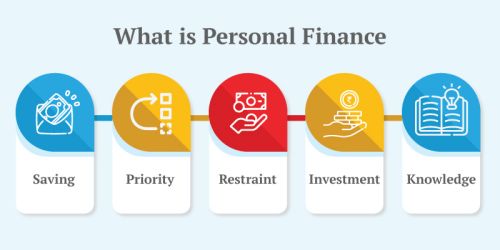Advertisement
In today's rapidly changing world, achieving financial stability and success requires more than just earning a paycheck and paying the bills. The intricacies of personal finance can be daunting, but with the right strategies and mindset, anyone can navigate the complex landscape of finance to secure their future. In this article, we will explore key principles and practical tips for mastering personal finance.
1. Budgeting: The Foundation of Financial Success
One of the fundamental pillars of personal finance is budgeting. Creating a well-structured budget helps individuals track their income and expenses, providing a clear understanding of where their money is going. Start by listing all sources of income and categorizing monthly expenses into essentials (e.g., housing, utilities, groceries) and discretionary items (e.g., entertainment, dining out).

Allocating a certain percentage of income to savings and investments is equally important. This not only builds an emergency fund but also lays the groundwork for future financial goals, such as buying a home or retiring comfortably. Remember, a budget is a dynamic tool that can be adjusted as circumstances change.
2. The Power of Compound Interest
The concept of compound interest is a cornerstone of wealth accumulation. It involves earning interest not only on the initial investment but also on the accumulated interest over time. The earlier individuals start investing, the more time their money has to compound, leading to exponential growth. This underscores the importance of investing as soon as possible, even if the amounts are small.
3. Debt Management: Balancing Act
While debt can be a useful tool for achieving financial goals, managing it is crucial. High-interest debts, such as credit card balances, can quickly spiral out of control and hinder financial progress. Prioritize paying off high-interest debts first, and consider consolidating or refinancing options to lower interest rates. Responsible use of credit, coupled with regular payments, can help build a positive credit history.

4. Emergency Fund: Shielding Against Uncertainties
Life is unpredictable, and unexpected expenses can throw even the most meticulous budget off track. Establishing an emergency fund equivalent to three to six months' worth of living expenses provides a safety net during challenging times, preventing the need to rely on high-interest loans or credit cards. Keep the emergency fund in a separate account that is easily accessible but not too tempting for everyday spending.
5. Diversification and Investment
Investing wisely is key to growing wealth over time. Diversifying investments across different asset classes, such as stocks, bonds, and real estate, reduces risk and enhances the potential for returns. While stocks offer higher potential returns, they also come with greater volatility. Bonds provide stability but may have lower growth potential. Balancing these investments based on risk tolerance and financial goals is essential.
6. Retirement Planning: Securing the Golden Years
Planning for retirement is an often-overlooked aspect of personal finance. Contributing to retirement accounts, such as a 401(k) or IRA, offers tax advantages and ensures a comfortable retirement. Starting early allows investments to compound over time, building a substantial nest egg. Regularly reviewing and adjusting retirement plans based on changing circumstances is essential to stay on track.
7. Continuous Learning: Staying Financially Savvy
The world of finance is ever-evolving, with new investment opportunities, tax regulations, and financial products emerging regularly. Engaging in continuous learning through books, online resources, and financial courses can help individuals stay informed and make informed decisions. Seeking advice from certified financial planners can provide personalized guidance tailored to individual circumstances.

8. Mindful Spending: Quality over Quantity
In the age of consumerism, distinguishing between wants and needs is crucial. Practicing mindful spending involves making intentional choices that align with long-term financial goals. Prioritize value and quality over instant gratification. Avoid impulse purchases and consider the long-term impact of every expense on financial well-being.
Mastering personal finance is a journey that requires commitment, discipline, and a willingness to adapt. By embracing budgeting, harnessing the power of compound interest, managing debt, building an emergency fund, diversifying investments, planning for retirement, and staying informed, individuals can navigate the complex landscape of finance with confidence. Remember, financial success is built on a solid foundation of informed decisions and strategic actions that pave the way for a secure and prosperous future.
Advertisement
Advertisement
- Previous article
- Understanding Universal Life Insurance: A Comprehensive Overview!
- Next article
- Evolution and Transformation: A Glimpse into the Modern Banking Industry
Advertisement
OTHER NEWS

Do you Need a Travel Credit Card?
BY Wendy

Consolidating Credit Card Debt: Tips and Options!
BY Wendy

Angry Birds 2: A Feathery Sequel Soaring with Thrills and Strategy!
BY Wendy

How to Successfully Negotiate a Real Estate Commission and Save Money?
BY Wendy

Unveiling the Financial Industry
BY Little Grapes

Recently, Silicon Valley Bank Declared Bankruptcy! How Will This Affect the Financial World?
BY Wendy
RECENT NEWS
-

Demystifying Bitcoin
-

Securing and Maintaining High Limit Credit Cards: A Comprehensive Guide!
-

The investment value of men’s watches
-

Guarding Against Credit Card Fraud: What to Do If Your Identity Is Compromised?
-

Strategies for Success in the Watch Industry
-

Understanding Survivorship Life Insurance: Planning for the Future Together!

 1
1 1
1